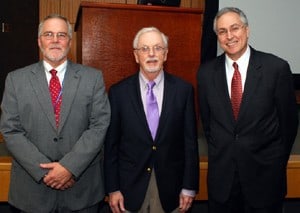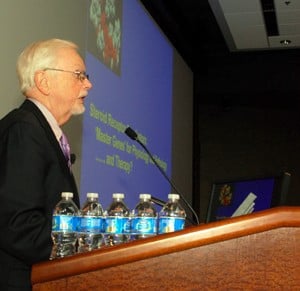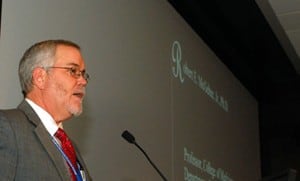UAMS Hosts First McGehee Distinguished Lecture
|
March 12, 2012 | The first Robert E. McGehee Jr., Ph.D. Distinguished Lectureship in Biomedical Research offered the UAMS Graduate School dean a chance to publicly thank major influencers in his life and career. McGehee, also a professor of pediatrics in the division of neonatology in the UAMS College of Medicine and executive director of the Arkansas Biosciences Institute, credited his mother and a high school science teacher as well as various advisors and colleagues. The large crowd for the March 8 lecture also heard molecular biologist Bert O’Malley, M.D., discuss the tantalizing possibilities for treating cancer and other diseases offered by a focus on the behavior of a particular gene. O’Malley, the Tom Thompson Distinguished Service Professor and chair of Molecular and Cellular Biology in the Baylor College of Medicine, dubbed the gene known as SRC-3 as the “master gene” for its important and varied roles in cellular biology. “SRC-3 is a very powerful growth gene that is often co-opted by cancer,” said O’Malley, pointing to its role in several forms of cancer, including breast, prostate and lung. His team is now looking at compounds that could target the gene. Proof of principle studies have shown that cancer cells denied access to the gene to assist in their growth essentially kill themselves, he said. O’Malley was guest lecturer for the first McGehee distinguished lectureship, established last year thanks to a gift from the grandparents of a student mentored by McGehee. The couple, who asked to remain anonymous, appreciated McGehee’s support and influence as a mentor. In introducing McGehee, Michael Jennings, Ph.D. professor and chairman of the Department of Physiology and Biophysics, pointed to McGehee as a multi-tasker successfully juggling research and administrative jobs while still teaching and mentoring students. “Having a successful research program is only a small part of what Dr. McGehee has done for UAMS,” Jennings said outlining McGehee’s 12 National Institutes of Health funded projects including continued research on the molecular mechanisms linking Type 2 diabetes and obesity. McGehee praised the longtime UAMS supporters whose gift supported the lectureship. He called the lectureship an enduring gift that will benefit UAMS and the state by inviting leading biomedical researchers to share their knowledge and work. “You know, I was content with the knowledge that if I had any legacy it was the students that I’ve encountered,” McGehee said. “This is just the icing on the cake.” He said he wanted to publicly thank those who had influenced his life. He started with his mother and a long ago conversation about whether or not he should go to college. “’What are you going to do with your life, pump gas?,’” he said she asked, to which he responded, “’Somebody’s got to do it.’” An Arkansas native, McGehee mentioned his 10th grade biology teacher Jewell Whatley and showed a slide of a biology assignment where she gave him a zero grade and chided his work. “She taught me to find something I loved to do and do it,” he said. Retired University of Central Arkansas professor Jimmy Throneberry, Ph.D., nudged him toward teaching. University of Arkansas at Little Rock biology professor Tom Lynch, Ph.D., convinced him to go to graduate school. Lawrence Cornett, Ph.D., now the UAMS vice chancellor for research and College of Medicine executive associate dean for research, was his graduate school advisor. As a student, McGehee said he worked in Cornett’s lab, taught some classes and worked as a tutor. His UAMS experience also was marked by the late biochemistry department chairman Ernie Peck, Ph.D., McGehee said. Then he credited the experience he gained as a research fellow at Harvard Medical School, working in the lab of endocrinologist Joel Habener, M.D. “I owe an awful lot to a lot of people,” he said, also praising his wife, Kay, and family for their support. McGehee noted that O’Malley and Peter Kohler, M.D., UAMS vice chancellor for the northwest Arkansas region, served as medical residents together. They co-authored a paper together during that time. O’Malley, who has been called the father of molecular endocrinology, is a recipient of the National Medal of Sciences among the more than 50 awards and honors for his work. He has trained more than 250 scientists and published more than 700 papers in addition to holding 23 patents in the fields of gene regulation, molecular endocrinology and steroid receptor and coactivator action and medical therapies.
|


